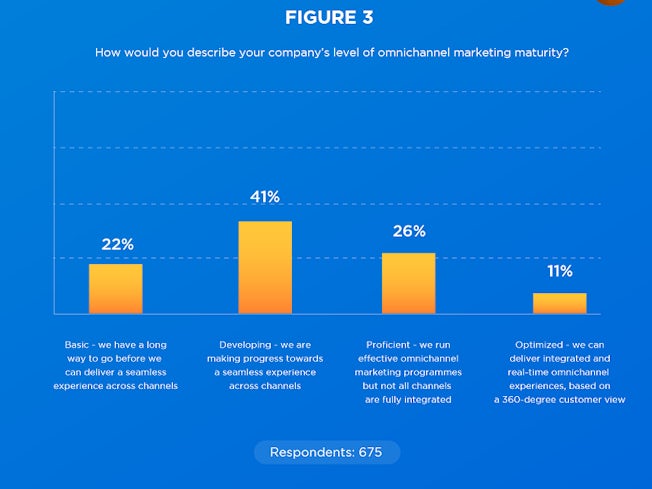The report is based on an Econsultancy survey of 1,416 business professionals, which took place between September and November 2019.
63% of marketers say omnichannel is still out of reach
According to the report, only a few marketers have gotten to grips with omnichannel marketing. At the time of the survey, 63% of respondents said that they were at a ‘basic’ or ‘developing’ level. Just 11% of marketers report that they are able to ‘deliver integrated and real-time omnichannel experiences, based on a 360-degree customer view’.
Interestingly, the survey highlights the fact that IT executives tend to be less likely than marketers to describe their organisations as ‘proficient’ or ‘optimised’ in relation to omnichannel marketing.
It’s suggested that this is due to IT being more aware of the data and technical risks faced by businesses (as well as the challenges of integrating martech stacks), and therefore less likely to be more optimistic. Or perhaps, rather, more likely to offer a realistic viewpoint.

Organisations are still failing to use marketing automation
So, what’s holding back marketers from delivering omnichannel experiences? The report suggests that failure to implement proper marketing automation technology is still a big barrier; only 31% of respondents say they use MA systems within their organisations.
This doesn’t necessarily mean that software isn’t available, but that it is not properly understood or integrated into wider marketing channels. Again, IT executives report a different picture to marketers, with the latter typically underestimating the amount of tools at their disposal.
According to IT execs, 50% of organisations have implemented more than ten marketing solutions, and 27% have more than 20 tools.
Organisational siloes remain a big barrier for the mainstream
Siloed organisational structures appear to be another reason why marketers are failing to deliver an omnichannel approach. At the time of the survey, 29% of mainstream companies report that they ‘have a siloed organisational structure rigidly organised around business functions.’
More positively, just 19% of leading companies say the same. This is because forward-thinking companies are more likely to establish a central team of representatives across functions, in order to bring customer experience to the forefront and help steer improvements.
To learn more, subscribers can download the ‘State of Martech Integration 2020-21’ report in full

Comments